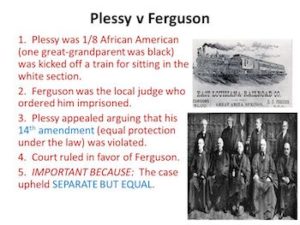
Segregation in America
On this date in 1896, the Supreme Court upheld Plessy v. Ferguson. This “separate but equal” Louisiana decree marked the formal beginning of Jim Crow Laws and an end to Reconstruction.
The Plessy case grew out of a careful strategy to test the legality of a Louisiana law passed in 1890 that required railroads to maintain separate train cars for Blacks and whites. In September 1891, a group of Blacks in New Orleans, Louisiana, formed “The Citizens Committee to Test the Constitutionality of the Separate Car Law" and raised $3,000 to mount a formal challenge to segregation in Louisiana. Albion Tourgee, then the nation’s best-known white advocate of Black legal rights, agreed to argue the case free of charge.
In June 1892, Homer A. Plessy bought a first-class ticket on the East Louisiana Railroad and sat in the car designated for Whites only. Plessy was of mixed African and European ancestry, and he looked white. The Citizens’ Committee wanted to challenge the segregation law in court, so it alerted railroad officials that Plessy would sit in the whites-only car. However, he was of African descent. Plessy was arrested and brought to court for arraignment before Judge John H. Ferguson of the U.S. District Court in Louisiana. Plessy then attempted to halt the trial by suing Ferguson because the segregation law was unconstitutional. This raised the legal question, which was argued and won four years later in Plessy v. Ferguson.
On January 5, 2022, Louisiana Gov. John Bel Edwards granted a posthumous pardon to Homer Plessy, the man at the center of the landmark civil rights Supreme Court ruling, Plessy v. Ferguson. Plessy descendants joined the governor at a ceremony in New Orleans, where he officially signed the pardon. The ceremony, attended by city leaders and relatives, was near the original location where Homer Plessy was arrested nearly 130 years ago.
Historic U.S. Cases 1690-1993:
An Encyclopedia New York
Copyright 1992 Garland Publishing, New York
ISBN 0-8240-4430-4